Faith, Empowerment, and Equality: A Conversation with Women and Young Women of Faith
CSW69 Beijing+30 Parallel Event | March 2025
According to the UN Secretary General, an inclusive and sustainable future for all requires confronting three major drivers of unsustainability: a world of impunity, a world of inequality and a world of uncertainty. At the core of impunity, inequality and uncertainty are women and girls, who are most affected and continue to face religious, social, economic, political, and cultural inequalities and subsequent violence, including because of their religion or belief. Against this background, is the strong commitment of women, including women faith actors, in advancing change despite the barriers and discrimination they face. Though often overlooked, historically, the role of women faith actors have been pivotal in advancing women’s rights and peace processes.

Event Panel, From Left to Right: Jessica Roland, Senior Specialist for Inclusive Peace at the Peacemakers Network as Moderator, Djeneba Toure, Member of the Youth Union of Mali, Nur Rofiah, Teacher of the Perguruan Tinggi Il mu Alquran, Rev. Dominic Misolo, Founder and President of the Institute for Faith and Gender Empowerment, Louise Allen, Advocacy Officer for Tearfund and Stella Attah, Peacebuilding and Religious Freedom Policy Advocacy Coordinator for Tearfund. March 2025.
On the sidelines of the 69th session of the Commission on the Status of Women (CSW) and thirtieth anniversary of the Beijing Platform for Action Declaration, the Joint Initiative for Strategic Religious Action (JISRA) consortium, consisting of partners the Network for Religious and Traditional Peacemakers, Mensen met een Missie, Tearfund, and the Faith for Action Network, showcased a dialogue on the importance of local, gendered and faith perspectives in the implementation of the Platform for Action, offering a coherent narrative on how inclusive approaches are vital for sustainable peace and development.
Louise Allen, Advocacy Officer at Tearfund provided welcoming remarks, explaining the JISRA consortium is an international, interreligious partnership, which aims to further peaceful and just societies where all enjoy Freedom of Religion or Belief (FoRB). The consortium supports religious actors, particularly women and youth, to become agents of peace and inclusion, and strengthen their capacities to engage in advocacy work to advance FoRB, and human rights, for all. The moderator of the event, Jessica Roland, Senior Specialist for Inclusive Peace at the Peacemakers Network then began a discussion with the panelists.
Nur Rofiah, Teacher of the Perguruan Tinggi Il mu Alquran in Indonesia emphasized that the gender and faith community need to raise awareness of women’s human experiences, which are unique and add-value to society. This is especially prevalent when it comes to combating the negative interpretation of religious texts which aim to disempower women and girls. Rofiah spoke of the first Ulama Fatwa that was developed in Indonesia in response to some of these negative interpretations,
“Our male dominated society initially responded thinking that the Fatwa was disobeying God, but we believe that God is just to all. And sometimes, you have to disobey these discriminatory laws to obey God.”

Panelist: Nur Rofiah, Teacher of the Perguruan Tinggi Il mu Alquran. March 2025. Photo: Mensen met een Missie.
Rev. Dominic Misolo, Founder and President of the Institute for Faith and Gender Empowerment then spoke of the need to promote positive masculinity to address the root causes of violence against women. He shares,
“I find myself in a lonely place as a man advocating for women’s rights…But the world is thirsty for women’s leadership and equality.”
Misolo called for more interfaith dialogues to align religious teachings and human rights principles, while also promoting gender sensitive religious interpretations of texts to dismantle patriarchal norms.
Finally, Djeneba Toure, Member of the Youth Union of Mali, spoke of the need to sensitize religious leaders in order to promote gender equality, including through working with the media and through amplifying and applying pressure through social media. Toure called for more access to education for young women to learn about their rights, including working with the Interreligious Council in Mali to promote gender equality and to support peace.

Panelist: Djeneba Toure, Member of the Youth Union of Mali. March 2025.
Follow the Peacemakers Network on social
